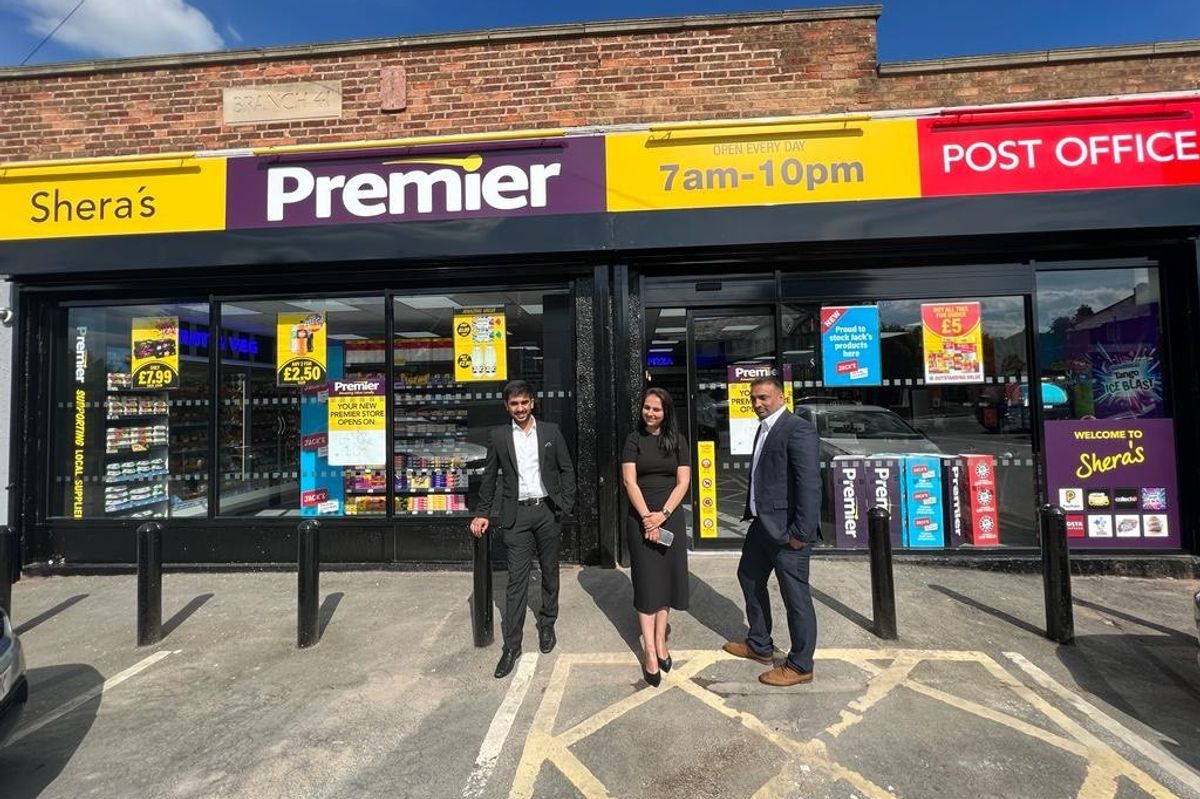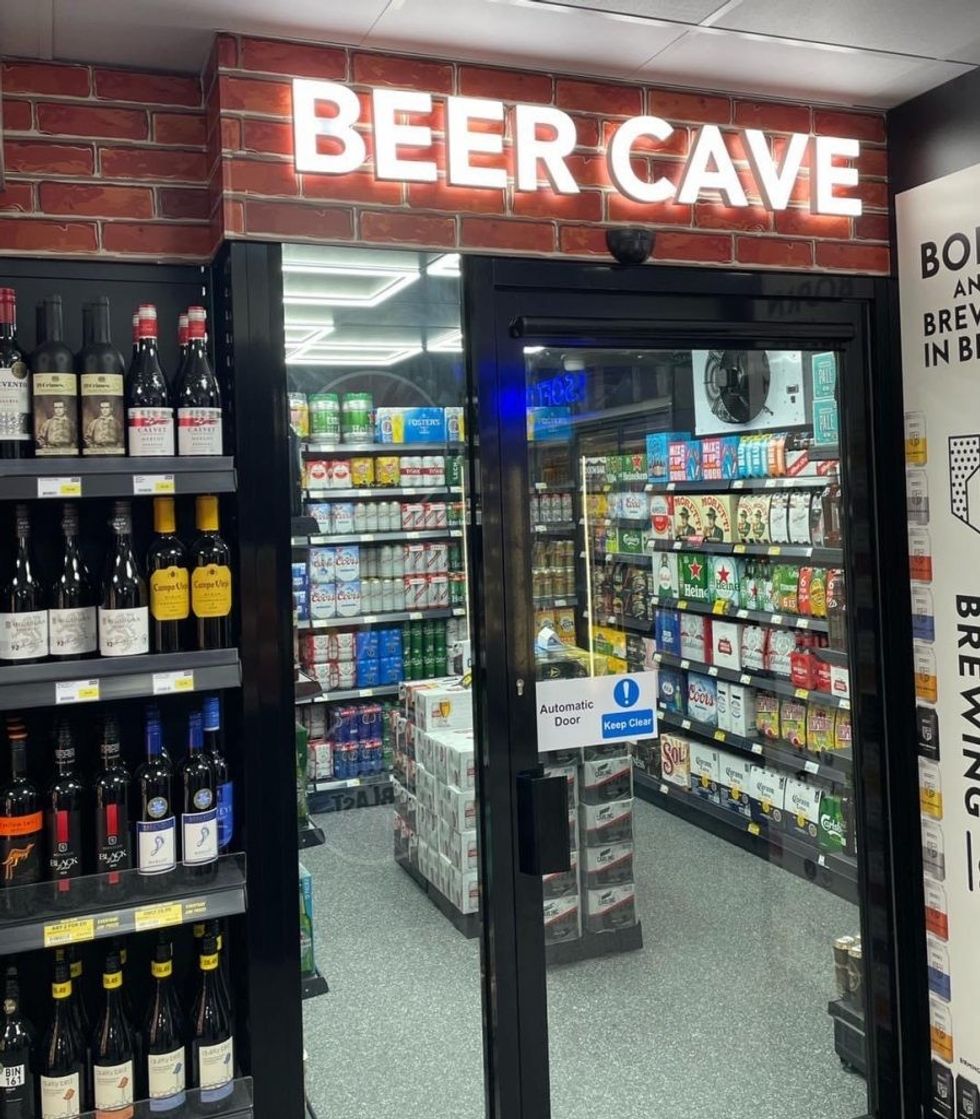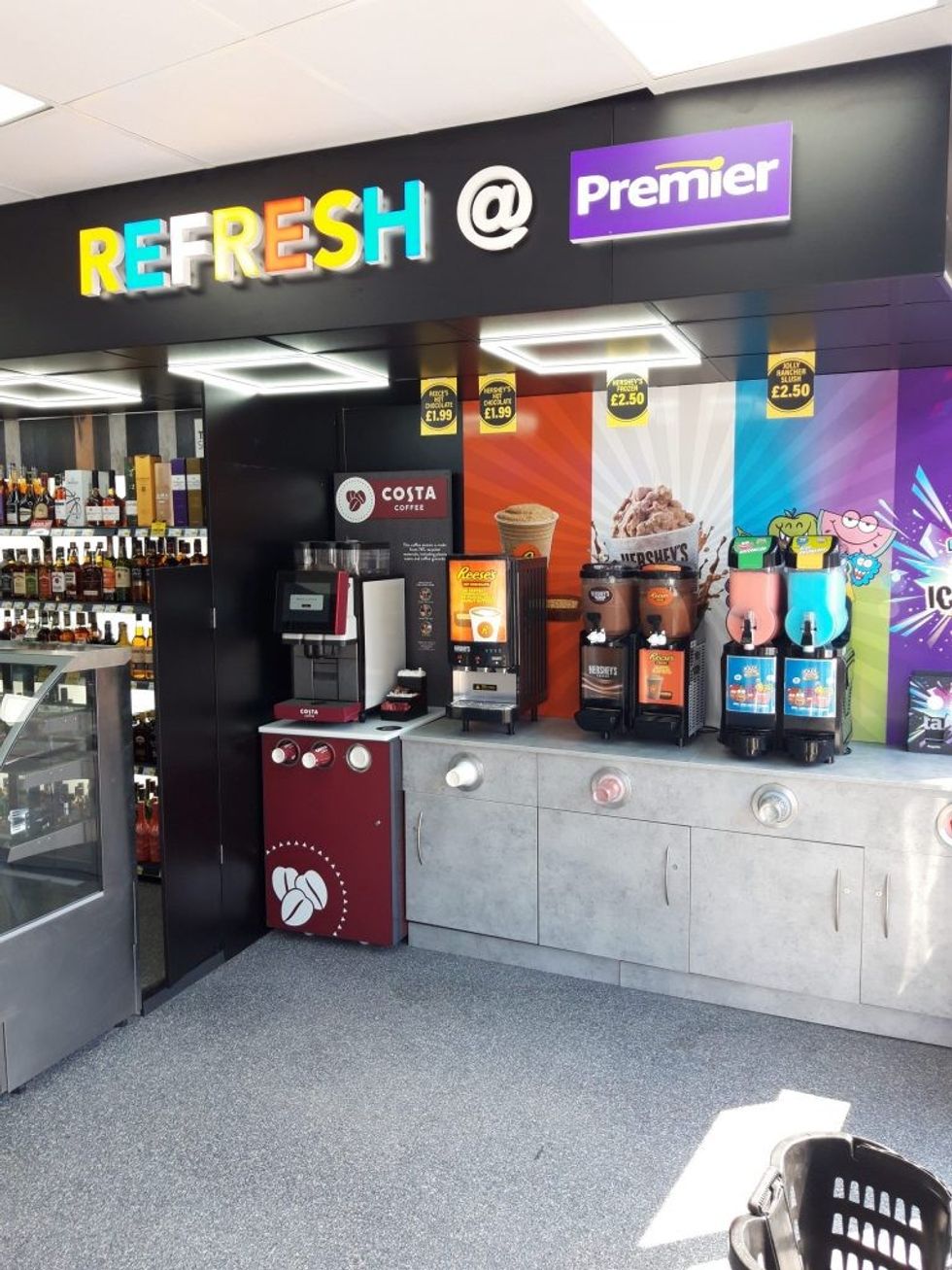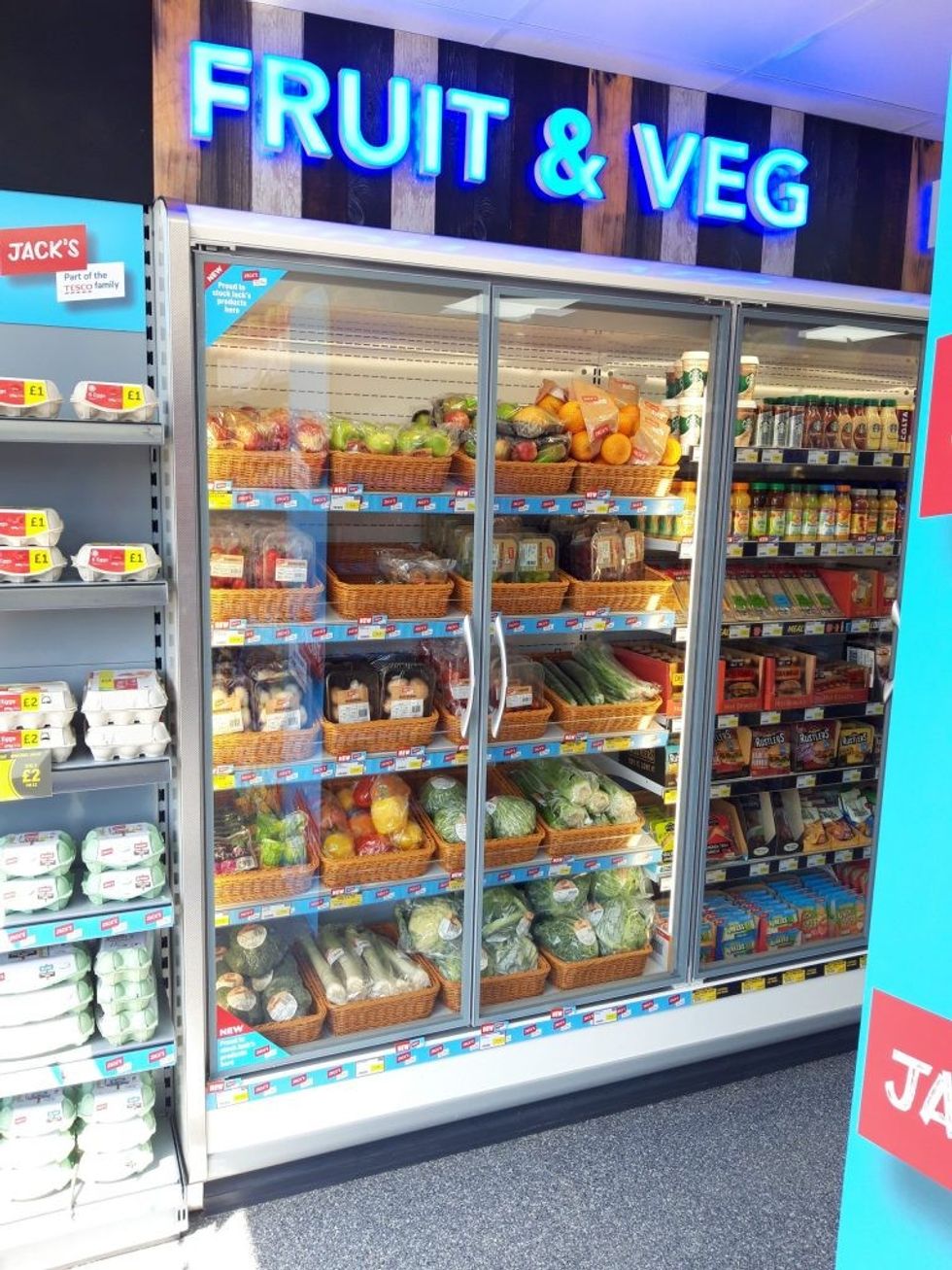Shera’s Premier in West Heath, Birmingham was a dream come true for Neha and Vikas Phoughat, and the store is something of a beer enthusiast’s dream! After a complete refit, they have developed the shop with the help of their symbol group and the results are stunning.
The store boasts a wide selection of wines and spirits catering to every price point and taste, all perfectly merchandised. But at the heart of the store is its spectacular beer cave that our roving judge described as one of the cleanest, brightest, best laid-out beer caves he has visited. And, this cornucopia of delightful drinks helped the couple win the Off Licence of the Year Award 2022 at the 34th Asian Trader Awards.
The husband and wife team complement each other in running the store, with Neha managing the day-to-day operations and Vikas looking after the finance, planning and business growth, while continuing to work in IT for the government.

Vikas arrived in the UK, from Haryana, India, in 2007 to purse his masters in computer security and forensics, and joined the British Army two years later.In 2012, he met Neha, who hails from the neighbouring Indian state of Uttarakhand, and the couple tied the knot on Christmas Day that year!
Vikas was deployed in Germany at the time – he also had stints in Canada and Afghanistan – and after a year, they decided to leave the Army. They moved back to the UK in 2013, buying a house in Birmingham. He started working as an IT consultant, but soon they entered the world of retailing.
“We decided as a family to open a Pizza Hut franchise establishment which is based in Darlington. We opened our first business in Darlington in 2014,” the couple says.
The venture would give them an opportunity to learn the business process. At the same time, they would be drawn into grocery retailing as Vikas had a job as cloud engineer at Costcutter, managing their point of sales, database, reporting and things like that, which gave him an insider’s view of the sector.
“So we always had a conversation how we move into the retail. We bought our first business in 2018 in the same area, where we have the new store,” they said. Within two years, the business would expand, acquiring the premises three doors away from them, where a Co-op used to operate, but hadbeen closed for some time. And their reason was: “We as a family decided to secure the premises to protect the first business.”
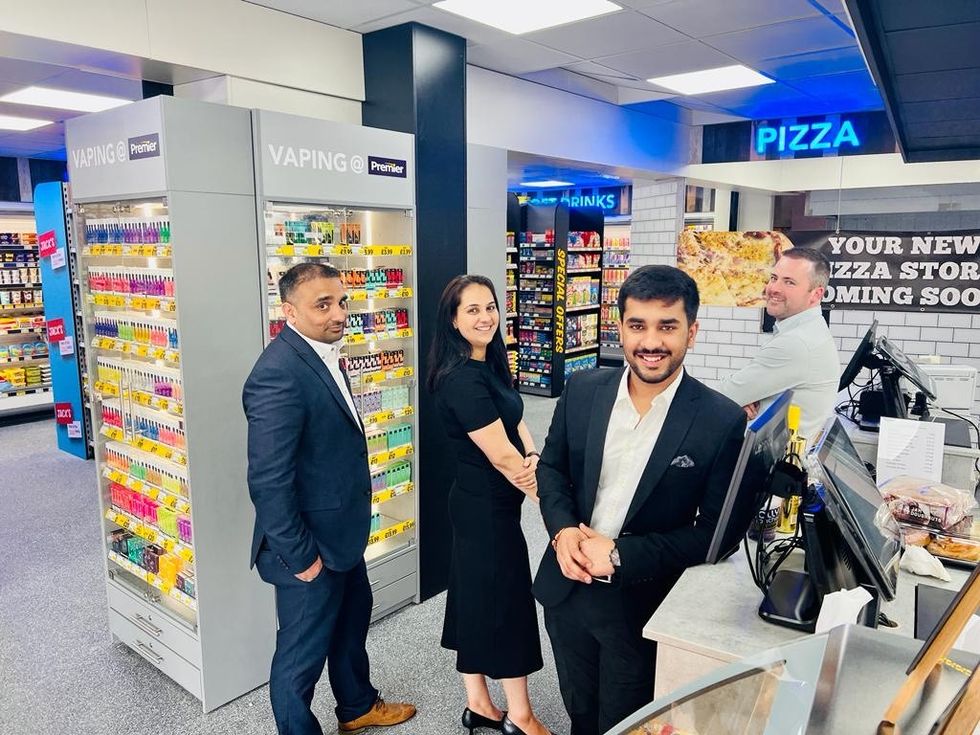
But the new premises would soon become their flagship, as they started exploring the possibilities of the site after the Covid-19 pandemic. Their first store was with Premier and a good relationship with the Premier team meant they were able to convince the fascia group to develop a concept store.
“They were also looking for the right candidate and the right place. We did manage to complete the store within the four weeks, from scratch to finish. And all credits go to all the team, including Premier’s, the guys who basically did the shop fitting and the BDM, who basically plays an important role, Barry Coleman,” Vikas and Neha say.
The beer cave advantage
The store started trading on 28 June last year, with Booker and Tesco bosses paying a visit. But what caught the eye of the townsfolk is the beer cave, the first in the West Midlands.
And the couple notes the many advantages of the concept, besides of course the novelty of experience that brings the shoppers in.
“Whenever we make a planning, we have to make it for a long term, cost effective point of view. And the beer cave plays a role. Plus,it saves on labor costs as well, to move the stuff from storage to thechillers.And when somebody is under 18, at least we can keep the stuff away from them by having a beer cave,” they explain – a great way to deter attempted underage sales.
The response to the beer cave has been overwhelming, and even appreciated by their competitors. In fact, one of the first persons who came into the store on the opening day was the manager of the nearby Tesco!
“They just want to have a look, saying ‘You guys might be stealing some of ourcustomers on the alcohol side!’We welcomed her and she was appreciative, ‘This is a nice one,’ she commented.‘Yes, we do understand you guys are competition, butwe always believe in appreciation.’ So that was the first reaction,” say thePhoughats.
“And once the people started getting to the store and they say, ‘Oh, this is your alcohol, oh, there’s a beer cave,’ and they said they wished they could have stayed in the [chilled] beer cave bit longer because it was the summertime!”
New rules of the game
The liquor section of the store is equally impressive, with all the lighting on the back of the counter and no blockers, like a duty-free shop in an airport. For Vikas and Neha, the store is all about changing the rules of the business.
“Whenever we discuss the details, people are talking about, ‘Oh, you must need a PayPoint, you must need a lottery, you need this, you need that, because these things bring the footfall’. So the experiment we did with the new storewas this: we have no cash machine, we have no PayPoint, no lottery, because our focus is more about basically getting a good insight into the business for analysis,” they say.
The main focus for them is the customer with “less than two seconds waiting time” and “a bit higher than average” basket spend. However, they agree that the only reason they took this bold decision is that they still have the old store nearby. “We keep all the services there. So we are still serving the community. It is not about taking the services off or doing some kind of discrimination with the customers by not providing those services,” they assert.
In fact, they have introduced the first cash machine and the first PayPoint into the area. “Most of the services have been introduced by us, those never used to be here before,” they say, adding that thedistinct focus for the two stores helps them serve different sets of customers effectively.
“From our point of view we have two types of customers: the ones that don't like to go to the big store or the shiny store because they might feel that they may have to spend more money and secondly, the customerswho just want it quick. They don't want to wait in the queue. They just want their good stuff and they have good average spend as well,” they explain.
“We are really doing well on that, because now we have a mix of customers, some of them we only for the new store, some customers we have for the old one, and some are basically doing their shopping at bothstores at the same time. So they walk into the new store and pick some stuff and some items and go back to the old post office to do their top-ups, lotteries, and they're still buying the stock from there.”
That’s what you can call a win-win situation!
Enter the Drop Ryders
Meanwhile, the Phoughats decided to close the Pizza Hut franchise and use the premises to develop our own franchising model, Spice and Slice, which was introduced to the Birmingham store in September.
“Slice is similar to Pizza Hut and Domino's, we keep roughly the same range. And spice is more about the Mediterranean foods like shawarma, and now we're adding vegan. We differentiate the two things, one is more about fast food and the second is more aboutfor the vegan-oriented community or the Mediterranean. That's why we came up with the idea of calling it Spice and Slice,” Vikas and Neha say.
They opened the first store in Darlington and Birmingham was the second store, and the feedback has been good, they add. Now they are working to developtheir own software for the deliveries. “We are going to be the first store that’s going to basically to build our own platform and allow other retailers as well on that platform just like Uber Eats and Just Eat,” they add.
With Vikas’s background in IT, and their understanding of the sector, they are perfectly positioned to offer this solution in a yet-to-be-tapped convenience retail channel potential.
They expect what they term their Drop Ryders delivery platform to be fully up and running in two months’ time. “And then we start planning to bring more retailers and so they don't have to pay 20 or 25 per cent to Just Eat,” they say, noting that for retailers who are working around 20 per cent margin can’t really rely on these delivery platforms.
“They are working on a lesser margin whatever they are charging, and the price marks, technically they can't charge extra from the customer because it's annoying for them,” they point out.
In fact, they think that the decline in convenience delivery usage last year is partly due to retailers overcharging customers, who are already facing a financial squeeze, in order to compensate the platform charges. Andeven when some retailers develop their own website, Vikas finds them inadequate to serve the purpose.
“Those websites are basically not fulfilling the criteria for the engagement with the customer, like a notification, what promotion they can get. And the second thing is about the availability, like, how long the window is, how quickly they can deliver, 10 minutes, half an hour, these things really make a difference,” he says.
“Are we only delivering the retail or are we also delivering food as well?Because if you merge the food and the retail together, it will be the game changer because if somebody's finished the work, they have just reached home, and they want to have that pint and they want to have some food as well. And if they can getboth from the sameportal, or from the same vendor, it makes a difference.”
The Phoughats think the delivery side of the business is set to flourish as they observe certain behavioural changes on the part of consumers.
“People don’t have the time to walk. They are not doing the outings as they used to be able. The thing is, the whole family is not going for a common meal, everyone is going for their own choice, somebody wants to eat a burger, another family member wants to eat a curry …and the delivery is giving them the opportunity and is also helpful to retain the customer,” they explain.
“Talking about the old people, too, they can’t walk all the way. So delivery is not just for youngsters. It’s basically supporting the community.”
Navigating the crisis
With the cost-of-living crisis continues unabated, Vikas and Neha stress the importance of taking a shopper’s point of view as they navigate an increase in business costs themselves.
“Yes, we have a store. But if you put that on one side, take an example, we are living in a house and we have to do our shopping from Sainsbury’s, sometimes the small shop, from that point of view, yes, the prices are going up. And it's really hard,” they say.
“And we need to be very picky, what we want to eat for the next two days. So we only focus on those things. If you're not going to consume it in the next two or three days, then there's no point, and that money can be utilised somewhere else. Because whatever the stuff we used to buy for £100, for the same stuff now we have to spend £140 something.”
Stepping back into the retailer’s shoes, they say what once used to be a price point market is now more about the necessity. And things are getting really tough for retailers in the current circumstances, whether it’s the stock levels, labour or the energy bills.
“There many things retailers need to be involved in, like stocking, making sure there’s no surplus stock. If it’s more stock in the stock room, it’s expiring. If it’s expired, it’s money blocking. The labor cost is going to be increased,which is not an easy thing to manage. Even the day-to-day expenses have gone up. We used to pay 15p per kW for electricity. Now it’sgone up to 60p.The extra money is going out from the retailer’s pockets,” they add.
They note that the retailers need to be more cost effective in terms of how to manage the right people at the right place. The retailer needs to count every single hour, and they explain how:
“If you need one member of staff in the morning and you open the business, then useone rather than two. But if you know that customers start coming in a rush at nine in the morning, then bring the second worker at nine instead of seven in the morning. So saving the two hours, on seven days, saves 14 hours in a week. 14 hours in a week is roughly £140-150, or £600 in a monthwhich is going to be usedtowards the other expenses.”
They also flag up shoplifting as an issue of concern, alleging that they are not getting the support from the local authorities.
“We have a couple of incidents in our store as well, we took the CCTV image, we held onto the guys, and we gave them over to the police. But no action has been taken,” they lament.
Vikas and Neha believe in healthy competition. “That means there is an opportunity if they are doing something really good, we can learn from them. If we have some healthy competitors close to us, we always have the motivation to grow, do better, to improve the business to improve our skills.”
And they also believe that, as retailers, it’s their responsibility to allow equal space to everyone to grow, and it is reflected in the local produce they stock.
“We have to keep the local products on the shelf as well,” they say. “Because, if you're talking about the customer base, some of the customers still want to keep to the same taste. By keeping the local products we are serving the customers as well as really supporting the local suppliers.”
Burnishing skills
Coming from a non-retail background – being non-smokers, for example, the Phoughats didn’t know the names of the tobacco brands when they started out, they confess – they were warned that retail was not for them. But Vikas and Neha were willing to “get their hands dirty”.
“We said, okay, it's fine if you don't know [anything]. But if we work hard, spending maximum time within the premises, we get to know everything about the business. And that was the case,” they say. “So whoever is keen to get into the business, they have to give their full commitment. If they have to sleep in the store, they have to sleep in the store!”
Someone from a good financial background might have a different approach, they agree – “Because there are two ways to do business, either spending money, or saving on time and learning from hard work” – but they see an advantage for those learning from the hard work.
“When the people have been through the Covid situation, only those businesses, those who learned from scratch, survived.Because they know all the ins and outs, they know which process they have to control,” they note.
“In parallel, retailers have to upgrade their skills from time to time. It’s not about opening the premises and think ‘Oh, that place is going to look after us for the next 20 years’. It’s not going to happen. They have to brush up their skills on day-to-day basis.”

